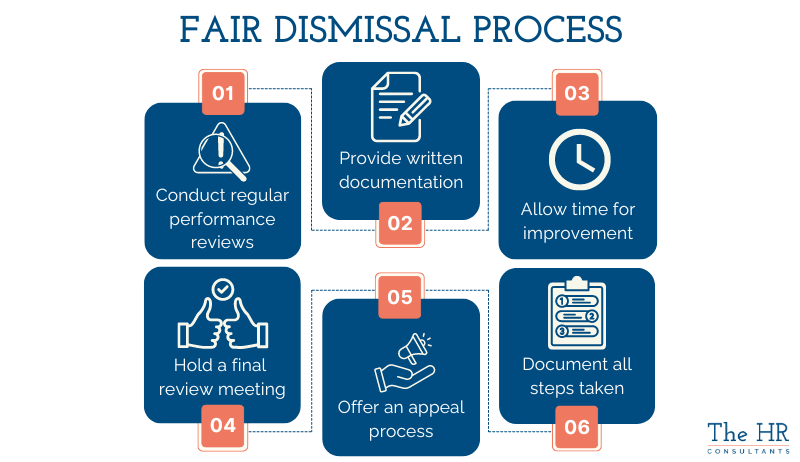A probationary period is a trial phase at the beginning of an employee's contract, allowing both the employer and the employee to assess the suitability of the role and the working environment.
Typically ranging from three to six months, this period enables employers to monitor an employee’s performance, behaviour, and alignment with company values before confirming permanent employment. For employees, it offers a chance to determine if the position meets their expectations.
However, dismissing an employee during their probationary period can be challenging. While probationary employees have fewer protections than permanent staff, they still hold significant statutory employment rights. Missteps in the dismissal process can result in unfair dismissal claims or employment tribunal cases.

At The HR Consultants, we can assist employers in managing this process fairly and legally, ensuring compliance with employment law and reducing legal risks.
Table of Contents
Introduction
What Is a Probationary Period?
Grounds for Dismissal During the Probationary Period
The Dismissal Procedure During a Probationary Period
Avoiding Legal Risks in Dismissals
Best Practices for Employers
Talk to the Experts
Frequently Asked Questions
What Is a Probationary Period?
A probationary period is a trial phase at the start of employment, allowing both the employer and the employee to evaluate whether the job and the working relationship are a good fit. While it is not a legal requirement, many businesses implement a probationary period to review an employee's performance, conduct, and suitability for the role.
These periods typically last between three and six months, but the length can vary depending on the industry and the specific role.
During the probationary period, employees retain basic statutory employment rights, such as the national minimum wage, the right to statutory sick pay, and protection against unlawful discrimination.
Purpose of a Probationary Period
Employers use probation periods to:
- Assess the new employee's performance and how well they meet the required standards.
- Observe how the employee fits into the company’s working environment and culture.
- Evaluate how the employee adapts to the team, the role, and the company's business practices.
For employees, the probationary period provides an opportunity to:
- Determine whether the role meets their expectations.
- Gain a clear understanding of their responsibilities.
- Address any performance issues early on and adjust accordingly.
Legal Considerations in Probation Periods
Despite being in a probationary period, employees still have statutory employment rights under UK employment law. This includes the right to receive at least the national minimum wage, statutory sick pay, and paid annual leave.

Employers must also be mindful of laws preventing unlawful discrimination, meaning employees cannot be dismissed for reasons related to age, race, gender, sexual orientation, or any other protected characteristic.
Additionally, while employers have more freedom to dismiss probationary employees, this must be done in line with the agreed employment contract and must comply with the legal requirement of providing a statutory notice period.
Failure to follow proper procedures could lead to wrongful dismissal claims, even during a probationary period.
Grounds for Dismissal During the Probationary Period
Dismissals during the probationary period can be based on several valid reasons, ranging from poor performance to redundancy. While employers have more flexibility during this time, they must still follow employment law to avoid unfair dismissal claims.
A fair approach ensures that both the business and the employee's rights are respected, reducing the risk of disputes.
Fair Reasons for Dismissal
When dismissing an employee during their probationary period, it's important for employers to ensure the reasons are fair and well-documented. Fair dismissals are based on legitimate concerns about the employee's performance or behaviour. Proper communication and following a transparent process help protect the employer from potential legal claims. Below are common fair reasons for dismissal:
- Poor performance: Employees not meeting the required performance standards, despite receiving feedback and opportunities to improve.
- Persistent lateness or absenteeism: Regular tardiness or unexplained absences disrupting workflow and company operations.
- Gross misconduct: Serious violations like theft, abusive behaviour, or other breaches of company policy warranting immediate dismissal.
- Breach of the employment contract: Failure to adhere to the terms outlined in the employment contract, such as non-compliance with company policies.
Unfair Reasons for Dismissal
Unfair dismissals during the probationary period occur when employees are let go for reasons that violate UK employment law, particularly when discriminatory factors are involved. Employers must be cautious to avoid such dismissals, as they can result in legal claims and tribunal cases.
Below are examples of automatically unfair dismissal reasons:
- Discrimination: Dismissing employees based on protected characteristics such as pregnancy, sexual orientation, race, or gender.
- Health and safety concerns: Employees cannot be dismissed for raising legitimate health and safety issues within the workplace.
- Whistleblowing: Dismissing an employee for reporting misconduct or illegal activity within the company, known as whistleblowing, is unlawful.
- Violation of employee rights: Dismissing an employee for exercising statutory rights, such as requesting sick leave or fair wages, is also considered unfair.
Additionally, employers should be mindful of constructive dismissal, where an employee resigns due to the employer's actions, creating intolerable working conditions.
The Dismissal Procedure During a Probationary Period
When considering the possibility of dismissal, it's essential to follow a structured process to ensure fairness and compliance with employment law.
Employers should take into account the employee’s performance, fit with the company culture, and any relevant contractual obligations.
Fair Dismissal Process
A fair dismissal process is essential for protecting both employers and employees. It ensures that decisions are made based on clear and objective reasoning, with proper procedures in place. Following the right protocol is key for avoiding disputes.
Below is a step-by-step guide for conducting a fair dismissal process:
- Conduct regular performance reviews Hold probationary review meetings to assess the employee's performance and highlight any concerns. These reviews should provide the employee with an opportunity to improve and clearly define expectations.
- Provide written documentation If performance issues persist, provide the employee with a written statement detailing the concerns and the areas that require improvement. Document each meeting and the feedback provided.
- Allow time for improvement Give the employee sufficient time to address the concerns. This demonstrates that the employer is acting fairly and gives the employee the chance to rectify performance issues.
- Hold a final review meeting If the employee’s performance has not improved, arrange a final meeting. Communicate the decision to dismiss the employee, ensuring the reasons are clear and objective.
- Offer an appeal process Allow the employee the opportunity to appeal the decision. This shows that the employer has followed a fair procedure, reducing the risk of an unfair dismissal claim.
- Document all steps taken Keep records of all performance reviews, meetings, and communications with the employee. Proper documentation is important for defending against any claims of unfair dismissal.

By following these steps, employers can ensure that the dismissal process is fair and compliant with employment law, reducing the risk of legal disputes.
Notice Periods and Final Pay
In most cases, an employee dismissed during their probationary period is entitled to a statutory notice period, which is typically one week's notice after completing one month of continuous service.
Employers should calculate the notice based on the employee’s contract or the statutory minimum requirements. During this time, the employee should be paid in full, and any accrued holiday pay should be included in their final payment.
Additionally, if the employee is being made redundant, they may be entitled to statutory redundancy pay, depending on their length of service. Employers must ensure they provide the correct final pay to avoid any disputes, ensuring that all contractual and legal obligations are met.
Avoiding Legal Risks in Dismissals
When dismissing an employee during their probationary period, it's essential to follow a fair and compliant process to avoid potential legal risks. Failing to do so can lead to claims of unfair dismissal or wrongful dismissal.
Ensuring proper procedures are in place, including performance reviews and providing the employee with an opportunity to improve, reduces the likelihood of legal complications.
Offering employees the right to appeal the decision is also a key element in mitigating risks. By providing a clear appeal process, businesses show that they are committed to fair treatment, further decreasing the likelihood of disputes and claims being escalated to an employment tribunal.
Preventing Wrongful Dismissal
Wrongful dismissal occurs when an employer dismisses an employee in breach of their employment contract. To avoid this, it's vital to adhere to the terms set out in the employee's contract, especially in relation to notice periods and contractual rights.
Dismissing an employee without the correct procedure, or dismissing them for reasons not outlined in the contract, can expose the business to claims of wrongful dismissal.
By following a fair dismissal process, such as conducting regular probationary review meetings and documenting performance issues, employers can protect themselves against potential claims.
Employment Tribunal Risks
If a dismissal leads to an employment tribunal, employers may face costly and time-consuming legal challenges. Employment tribunals assess whether the dismissal was handled fairly and followed UK employment law.

To avoid the risk of negative tribunal rulings, it’s important to follow the correct procedures.
Consider these key points:
- Failure to follow procedures: Not offering an appeal, failing to provide the correct statutory notice period, or not documenting performance issues can lead to adverse rulings.
- Documentation is essential: Maintain accurate records of the dismissal process, including review meetings, written warnings, and reasons for dismissal.
- Consistency is key: Ensure that all employees are treated fairly and consistently to avoid claims of discrimination or unfair dismissal.
- Compliance with statutory rights: Make sure the employee's statutory employment rights, such as minimum notice periods and protection from unfair dismissal, are respected.
Adhering to Statutory Notice Periods
One of the key aspects of managing dismissals during the probation period is adhering to the statutory minimum notice period.
Employees are entitled to at least one week's notice after they’ve been employed for a month or longer, and this must be provided even during the probationary period.
Employers should be aware that failure to provide the correct notice period can lead to legal disputes, particularly claims of wrongful dismissal.
This applies to both probationary employees and those with longer periods of continuous employment.
Documenting the Dismissal Process
Employers should always maintain an accurate record of the dismissal process. This includes documenting performance issues, probationary review meetings, and any actions taken to support the employee's improvement.
Keeping documented evidence helps ensure that the employer can demonstrate a fair procedure was followed, which can be vital if a claim of unfair dismissal arises.
Such records also serve as evidence that the dismissal was handled professionally, reducing the risk of the employee claiming they were unfairly dismissed.
This approach ensures transparency and fairness throughout the process, protecting both the employer and employee.
Best Practices for Employers
Effectively managing probationary periods is essential to ensuring both the success of new hires and the smooth functioning of the business.
Conducting a thorough probationary review meeting, documenting concerns, and managing employee performance are all key components in handling this stage professionally.
By following a set of best practices, employers can reduce the likelihood of needing to dismiss probationary employees while ensuring compliance with employment law.
Managing Employee Performance
A clear performance management strategy is essential during the probationary period. Setting out clear expectations for employee performance from the start helps avoid misunderstandings and provides a framework for measuring progress.
Regular meetings should be held to discuss any concerns or areas where improvement is needed, giving the employee the chance to respond and make changes.
In addition, employers should take the time to evaluate whether the employee fits within the company's business practices and company culture.
Offering Support and Training
Providing support and training during the probation period can help prevent early dismissals. Employers should offer additional training opportunities if performance issues arise, especially if the problems stem from a lack of understanding or experience.

Key benefits of ongoing training include:
- Improved job performance: Training helps employees better understand their roles and responsibilities, increasing efficiency.
- Enhanced confidence: Employees feel more secure in their skills and ability to perform when they receive proper guidance and training.
- Increased retention: Supporting employees with ongoing development reduces turnover, preventing the need for dismissal.
- Adaptability to changes: Regular training equips employees to handle evolving business practices or new technologies.
- Boosted morale: Offering development opportunities shows the company’s commitment to the employee’s growth, improving job satisfaction.
Holding a Probationary Review Meeting
A probationary review meeting is an important step in the probation process. It provides a formal opportunity to assess the new employee’s progress, identify any areas for improvement, and decide on the next steps.
Employers should come prepared with documented evidence of the employee’s performance, as this helps ensure transparency during the discussion.
At the meeting, employers can set clear expectations for future performance and provide a timeline for improvement.
If dismissal is being considered, this meeting is the ideal time to explain the reasoning and outline a fair course of action, including any appeal process that the employee can pursue.
Documenting Performance Issues
Documenting performance issues is essential for building a fair and transparent dismissal process. Maintaining a clear record of performance reviews, feedback, and any disciplinary actions taken ensures that the employer can demonstrate they followed the correct procedure.
This documentation will be key in defending against any unfair dismissal claims.
By having an accurate record of all interactions with the employee, employers can show they took reasonable steps to support the individual before considering dismissal.
Conducting a Fair Procedure
Following a fair procedure for managing probationary employees ensures compliance with employment law. The probation period should be used as a time to assess whether the employee is meeting the required standards.
By clearly communicating issues and allowing the employee time to improve, the risk of unfairly dismissed claims is significantly reduced.
Employers should also ensure that all aspects of the dismissal, if required, follow the steps outlined in the employee's contract and adhere to statutory employment law experts recommendations.
Maintaining Employee Morale
Supporting employees throughout their probationary period helps maintain morale and reduces the likelihood of performance issues. Employers should focus on creating a positive work environment where employees feel valued and encouraged to improve.
This focus on employee well-being helps new hires succeed and ensures that the company operates smoothly without the frequent turnover of staff.
Talk to the Experts
Dismissing an employee during their probationary period requires careful consideration and adherence to a fair dismissal process.
By understanding the legal obligations, following a clear probationary period dismissal procedure, and offering adequate support, employers can ensure a smooth process that respects both the employee's and the company's rights.
To minimise legal risks such as unfair dismissal claims, it is essential to follow a fair procedure, including documenting performance issues and providing the opportunity for improvement.

If your business is seeking guidance on managing probationary dismissals effectively, get in touch with The HR Consultants for expert advice.
Frequently Asked Questions
Here are some common questions regarding dismissal during the probationary period.
Can an employee be dismissed at any point during their probationary period?
Yes, an employer can dismiss an employee at any point during the probationary period if there is a valid reason such as poor performance or gross misconduct. However, it is important to follow a fair process and provide the appropriate notice period to avoid any potential unfair dismissal claims.
What are the rights of employees during a probationary period?
Employees on probation still have basic statutory employment rights, such as the right to the national minimum wage, statutory sick pay, and protection from unlawful discrimination. They are also entitled to the statutory minimum notice period if dismissed after working for at least one month.
Can a dismissal during the probationary period be challenged?
Yes, probationary employees can challenge their dismissal, especially if they believe it was based on unfair reasons, such as discrimination or breaches of their employment contract. They may be able to file claims for unfair dismissal or wrongful dismissal if the dismissal process was not handled fairly."















